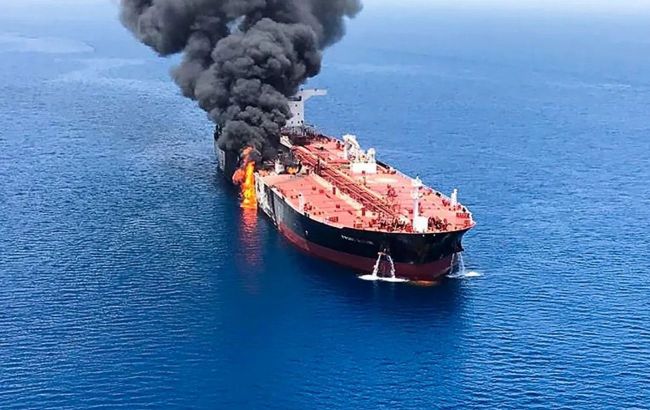Houthis attacked tanker carrying Russian oil - Bloomberg
 Photo: Marlin Luanda tanker of Trafigura Group (photo from open sources)
Photo: Marlin Luanda tanker of Trafigura Group (photo from open sources)
The Marlin Luanda tanker of the Trafigura Group, carrying Russian petroleum products for gasoline and plastics production, has been attacked by Yemeni Houthi rebels. The raw materials were loaded onto the vessel in Greece, indicating a violation of EU and US sanctions on the export of Russian petroleum products, according to Bloomberg.
It is noted that after Europe rejected Russian oil supplies due to the war in Ukraine, significant volumes of Russian oil now pass through the southern part of the Red Sea to Asian buyers. The vessel attacked last night was transporting fuel from Russia, and this likely concerns Moscow.
According to the analytical company Kpler, the tanker picked up its cargo of Russian origin through a process known as "ship-to-ship transfer" from the area of the Laconian Gulf in southern Greece. This region plays a crucial role in the supply of Russian oil to the global market and in processing raw materials that do not exceed the upper limit of the price. This indicates the use of shadow schemes in trade.
Trafigura, along with other commodity traders such as Glencore Plc, Vitol Group, and Gunvor Group, was one of the largest suppliers of oil from Russia before its full-scale invasion of Ukraine. The company was also a partner in a major oil project implemented by the state producer PJSC Rosneft.
After the imposition of sanctions by the US, Europe, and the UK on the export of Russian energy resources, Trafigura stepped away from these flows. Although the company's CEO, Jeremy Weir, stated that it continues to trade in small volumes of oil products from Russia, this position has nevertheless been reconsidered.
"That the company picked up a cargo via ship-to-ship transfer off the coast of Greece sheds light on how one of the world’s biggest commodity trading houses is resorting to less-than-transparent means as it continues to facilitate the export of oil products from Russia, at a time when war in Ukraine is still raging," states Bloomberg.
Yemeni Houthi rebels targeted the Marlin Luanda tanker of the Trafigura Group with rockets on the evening of January 26. The attack occurred approximately 55 miles southeast of the city of Aden. A fire broke out on board the vessel.
Bloomberg observes that this incident also indicates that the US and its allies have not sufficiently weakened the military capabilities of the Houthis, even two weeks after the first of several airstrikes on missiles, radars, and other targets throughout Yemen.
Over the weekend, Deputy National Security Advisor to the US President, John Feiner, reported that military actions to curb the Houthis and other Iran-backed groups will take some time.
Yemeni Houthi attacks and the response from western countries
Since November 2023, Yemeni Houthi rebels have been regularly launching drone, cruise, and ballistic missile attacks on commercial vessels in the Aden Strait and the Red Sea. The first attacks began immediately after the start of the conflict between Israel and Hamas in October.
In response to numerous attacks, on January 12, the United States and Britain launched missiles targeting Houthi military installations in Yemen.
On January 17, the U.S. designated the Houthis as a global terrorist organization, and the next day, they carried out additional strikes on militant positions.
From January 11 onwards, U.S. forces, along with allies, have destroyed over 25 Houthi missile installations.
The U.S. also imposed sanctions on key Houthi figures for their support of terrorist acts against maritime trade in the Red Sea.
On January 25, the U.S. urged China to persuade Iran to influence the Houthis and convince them to cease attacks.
On Friday, January 26, the Houthis launched an anti-ship ballistic missile at the U.S. destroyer USS Carney, but it was successfully intercepted.

